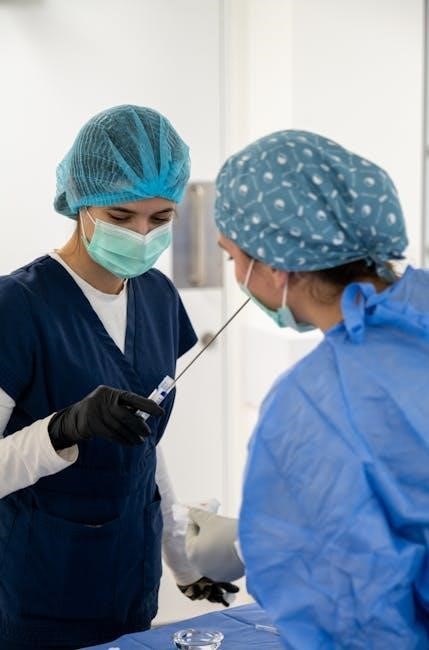
notes on medical surgical nursing pdf
Medical-surgical nursing focuses on caring for adult patients with various medical conditions or those undergoing surgery. It combines comprehensive assessment‚ individualized care plans‚ and skilled interventions. PDF notes provide a concise guide to understanding key concepts‚ such as wound care‚ pain management‚ and medication administration‚ essential for both students and professionals in this field.
1.1 Definition and Scope of Medical-Surgical Nursing
Medical-surgical nursing is a specialty focused on providing care to adults with acute or chronic illnesses‚ including those requiring surgical interventions. Its scope encompasses health promotion‚ disease prevention‚ and restorative care. Nurses in this field address diverse conditions‚ from cardiovascular disorders to respiratory diseases‚ utilizing evidence-based practices. PDF notes offer a comprehensive overview of key concepts‚ enabling nurses to deliver high-quality‚ patient-centered care effectively.
1.2 Importance of Medical-Surgical Nursing in Healthcare
Medical-surgical nursing plays a critical role in healthcare by providing holistic‚ evidence-based care to patients with diverse medical conditions. These nurses act as patient advocates‚ ensuring safe and effective treatment. Their expertise in managing acute and chronic illnesses improves patient outcomes and reduces hospital readmissions. PDF notes highlight the significance of this specialty in healthcare systems‚ emphasizing its impact on patient recovery and cost-effective care. Their work is essential for maintaining high standards of healthcare delivery.

Core Concepts and Principles
Medical-surgical nursing is built on patient-centered care‚ evidence-based practices‚ and interdisciplinary collaboration. It emphasizes holistic assessment‚ critical thinking‚ and continuity of care‚ guiding nurses in delivering high-quality‚ individualized patient care.
2.1 Patient Assessment and Nursing Diagnosis
Patient assessment in medical-surgical nursing involves a comprehensive evaluation of the patient’s physical‚ emotional‚ and functional status. This includes physical examinations‚ diagnostic tests‚ and review of medical history. Nursing diagnosis identifies specific health problems or risks‚ such as pain‚ infection‚ or mobility issues. Accurate assessment and diagnosis guide the development of individualized care plans‚ ensuring targeted interventions and improved patient outcomes. This process requires strong observational skills‚ critical thinking‚ and evidence-based decision-making.
2.2 Individualized Care Planning
Individualized care planning is a tailored approach to address a patient’s unique needs and goals. It involves setting specific‚ measurable objectives based on the patient’s diagnosis‚ preferences‚ and lifestyle. Nurses collaborate with the patient and healthcare team to develop a personalized plan that promotes recovery‚ prevents complications‚ and enhances quality of life. This process ensures targeted interventions and continuous monitoring to achieve optimal outcomes‚ making care both effective and patient-centered.
Clinical Skills and Procedures

Medical-surgical nursing requires essential clinical skills such as patient assessment‚ wound care‚ and medication administration. Proficiency in these procedures ensures safe and effective patient outcomes. PDF notes offer detailed guides on best practices and guidelines.
3.1 Wound Care and Management
Effective wound care involves assessment‚ cleansing‚ and dressing to promote healing and prevent infection. PDF notes emphasize the importance of identifying wound types (e.g.‚ pressure‚ diabetic‚ or surgical) and selecting appropriate dressings and topical treatments. Proper wound debridement and infection control measures are critical. Nurses should also monitor for signs of healing or complications‚ such as increased redness or purulent drainage‚ and adjust care plans accordingly. Regular documentation and patient education are key to optimizing outcomes.
3.2 Pain Assessment and Management
Pain assessment is crucial for effective management. Nurses use standardized tools like the 0-10 pain scale to evaluate intensity and characteristics. Accurate diagnosis of pain type (e.g.‚ acute‚ chronic‚ neuropathic) guides interventions. Pharmacological options include opioids‚ NSAIDs‚ and adjuvant therapies. Non-pharmacological methods like relaxation techniques and heat/cold therapy are also effective. Individualized care plans ensure patient-centered approaches‚ improving comfort and functional outcomes; Regular monitoring and adjustments to treatment are essential to optimize pain relief and minimize adverse effects.

Common Medical-Surgical Conditions
Medical-surgical nursing addresses diverse conditions‚ including cardiovascular disorders‚ diabetes‚ and respiratory diseases. These conditions often require chronic management and acute care interventions to improve patient outcomes and quality of life.

4.1 Cardiovascular Disorders
Cardiovascular disorders‚ such as hypertension‚ heart failure‚ and coronary artery disease‚ are common conditions in medical-surgical nursing. Nurses assess symptoms like chest pain‚ dyspnea‚ and edema‚ and monitor ECG and cardiac enzymes. Management includes medications (e.g.‚ beta-blockers‚ ACE inhibitors)‚ lifestyle modifications‚ and educating patients on risk factors. Complications like arrhythmias or cardiac arrest require urgent intervention. PDF notes provide detailed care plans and guidelines for managing these conditions effectively in clinical settings.
4.2 Respiratory Diseases
Respiratory diseases‚ such as COPD‚ asthma‚ and pneumonia‚ are prevalent in medical-surgical nursing. Nurses assess symptoms like wheezing‚ shortness of breath‚ and cyanosis. Interventions include oxygen therapy‚ nebulizers‚ and medication administration. Patient education on inhaler use and smoking cessation is crucial. Complications like respiratory failure require mechanical ventilation. PDF notes outline assessment tools‚ such as spirometry and lung auscultation‚ and evidence-based care guidelines for these conditions.
Surgical Nursing Care
Surgical nursing involves pre- and postoperative care‚ wound management‚ and infection prevention. Nurses monitor recovery‚ manage pain‚ and educate patients on post-discharge care.
5.1 Preoperative and Postoperative Care
Preoperative care involves assessing the patient’s physical and emotional state‚ educating them on procedures‚ and ensuring medication adherence. Postoperative care focuses on pain management‚ vital sign monitoring‚ and wound care. Nurses also provide guidance on recovery‚ infection prevention‚ and rehabilitation. Effective communication and patient education are critical to ensure a smooth transition and optimal outcomes. PDF notes often highlight these key steps‚ emphasizing the nurse’s role in surgical success and patient safety.
5.2 Surgical Site Infection Prevention
Surgical site infections (SSIs) are a significant concern in postoperative care. Prevention strategies include proper hand hygiene‚ antimicrobial prophylaxis‚ and sterile technique during surgery. Nurses play a crucial role in monitoring wounds and educating patients on infection prevention. PDF notes often outline these methods‚ emphasizing their importance in reducing SSIs and promoting patient safety. Effective postoperative care and wound management are essential to minimize the risk of complications and ensure optimal recovery outcomes.

Pharmacological Interventions
Pharmacological interventions in medical-surgical nursing involve the administration of medications to treat illnesses and manage symptoms. Nurses must monitor for side effects and ensure safety protocols are followed.
6.1 Medication Management in Surgical Patients

Medication management in surgical patients involves preoperative‚ intraoperative‚ and postoperative care. Nurses ensure accurate administration of prescribed drugs‚ monitor for side effects‚ and adjust dosages as needed. Antibiotics are often administered to prevent infection‚ while analgesics manage pain. Individualized care plans are crucial to address specific patient needs. Proper medication reconciliation and patient education are essential to ensure safety and adherence to treatment regimens.

Legal and Ethical Considerations
Medical-surgical nursing involves adhering to legal standards and ethical principles‚ ensuring patient rights‚ confidentiality‚ and informed consent. Nurses must navigate ethical dilemmas while providing compassionate‚ evidence-based care.
7.1 Patient Rights and Confidentiality
Patient rights and confidentiality are fundamental in medical-surgical nursing. Nurses must respect patients’ autonomy‚ dignity‚ and privacy. Maintaining confidentiality ensures trust and adheres to laws like HIPAA. Patients have the right to informed consent‚ refuse treatment‚ and access their medical records. Breaching confidentiality can lead to legal consequences and ethical violations. Nurses must balance patient rights with professional duties‚ ensuring care is respectful and non-discriminatory.

Technological Advancements
Electronic Health Records (EHRs) revolutionize medical-surgical nursing by enhancing documentation‚ care coordination‚ and patient monitoring. They improve medication management and provide real-time data for informed decisions.
8.1 Use of Electronic Health Records (EHRs)
Electronic Health Records (EHRs) are integral to modern medical-surgical nursing‚ enhancing patient care through improved documentation and real-time data access. EHRs streamline medication management‚ reduce errors‚ and facilitate care coordination among healthcare teams. They also support clinical decision-making by providing comprehensive patient histories and evidence-based guidelines. Nursing professionals can access these records securely‚ ensuring accurate interventions and efficient care delivery‚ making EHRs a vital tool in medical-surgical nursing practice.
Nursing Education and Resources
PDF notes are invaluable resources for nursing education‚ offering comprehensive summaries and exam preparation materials. They provide clear explanations of key concepts and clinical skills‚ aiding both students and professionals in medical-surgical nursing.
9.1 Role of PDF Notes in Nursing Education
PDF notes play a crucial role in nursing education by providing concise‚ accessible‚ and organized information. They offer comprehensive summaries of complex topics‚ making it easier for students to review and retain key concepts. These notes are particularly useful for exam preparation‚ as they often include practice questions and clinical scenarios. Additionally‚ PDFs are portable and can be accessed on various devices‚ allowing nurses to study anytime‚ anywhere. They also serve as a valuable reference for professionals seeking to refresh their knowledge or stay updated on best practices in medical-surgical nursing.
Career Opportunities
Medical-surgical nursing offers diverse career paths‚ including critical care‚ oncology‚ orthopedics‚ and leadership roles. Specialization and advanced certifications further expand professional opportunities in this field.
10.1 Specialization in Medical-Surgical Nursing
Specialization in medical-surgical nursing allows professionals to focus on specific areas‚ such as critical care‚ oncology‚ or orthopedics. Advanced certifications and focused training enhance expertise. PDF notes provide structured guides for mastering specialized skills‚ offering insights into complex patient care scenarios and evidence-based practices. These resources enable nurses to stay updated on the latest advancements‚ ensuring high-quality‚ tailored care. Specialization not only boosts career prospects but also contributes to improved patient outcomes in diverse clinical settings.